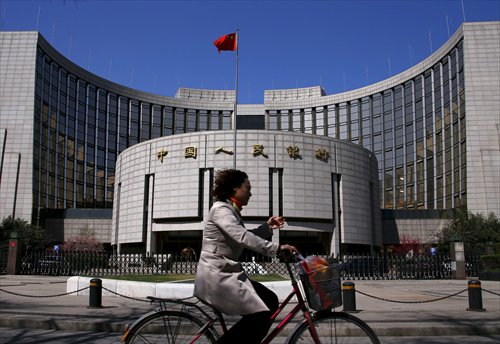M2 growth indicates ‘reasonable’ liquidity level
Bank lending hits record high, social financing falls

A woman rides past the headquarters of the People's Bank of China, China's central bank, in Beijing. File photo: CFP
China's new banking lending hit a record high in September, but total social financing weakened, according to official data, raising economists' expectations for more monetary and fiscal policy changes in the fourth quarter.
Domestic banks issued 1.05 trillion yuan ($165 billion) in new yuan-denominated loans in September, a year-on-year increase of 144.3 billion yuan and a record high, according to a report released on Thursday by the People's Bank of China (PBC), China's central bank.
In the first three quarters of 2015, total new yuan lending amounted to 9.9 trillion yuan, up 2.34 trillion yuan, year-on-year.
The PBC announced on Monday that it would expand a pilot program allowing banks to borrow money from the central bank using high-quality credit assets, a move that has widely been thought to encourage bank loans.
New yuan deposits had reached 13 trillion yuan as of September, up 1.93 trillion yuan against one year earlier.
China's broad money supply of cash in circulation and deposits, also known as M2, was 135.98 trillion yuan as of the end of September, up 13.1 percent from the same period in 2014, according to the PBC report.
Xu Hongcai, director of the Economic Research Department at the China Center for International Economic Exchanges, told the Global Times on Thursday that judging from M2 growth, China's liquidity is being maintained at a "moderate and reasonable" level.
Xu argued that this was partly due to the series of monetary easing measures taken by the Chinese government in recent months, although the effects of those policies have been relatively limited.
The Chinese government has rolled out a series of monetary easing policies this year to replenish liquidity in domestic markets, including making four successive cuts to both benchmark interest rates and the bank's reserve requirement ratio (RRR), the minimal level of reserves banks must hold.
China's total social financing - a broad measure of liquidity in the economy that encompasses bank loans, corporate bonds and equity financing - amounted to 11.94 trillion yuan as of September 2015, 578.6 billion yuan less than the corresponding period in 2014, according to the PBC data.
Xu called this an "understandable" phenomenon, as the government has strengthened its supervision of equity financing and bank loans in recent months.
"On the other hand, both commercial banks and enterprises have increasing concerns about investment risks. This loss of confidence in investment has reduced the scale of social financing," Xu told the Global Times.
But social financing activities have showed signs of improvement recently, with the amount of total social financing rising to 1.3 trillion yuan in September this year, up 217.2 billion yuan compared to August. The figure is up 214.5 billion yuan compared to September 2014.
Experts have noted that more monetary easing policies can be expected in the fourth quarter, as China presently faces downward economic pressure.
China's Producer Price Index, which measures wholesale prices, fell 5.9 percent in September, year-on-year, staying in negative territory for the 43rd straight month and indicating continued deflation pressure, statistics released by the National Bureau of Statistics on Wednesday showed.
"The PBC is expected to roll out another round of monetary easing, including a cut to bank interest rates and the RRR, as soon as third quarter GDP data is released," Liu Dongliang, an analyst at China Merchants Bank, told the Global Times on Thursday.
But Liu also noted that the implementation of monetary policies is not enough to prop up the real economy.
"The government should further increase the strength of the implementation of more fiscal policies, such as by ensuring that investment projects are properly executed," Liu noted.